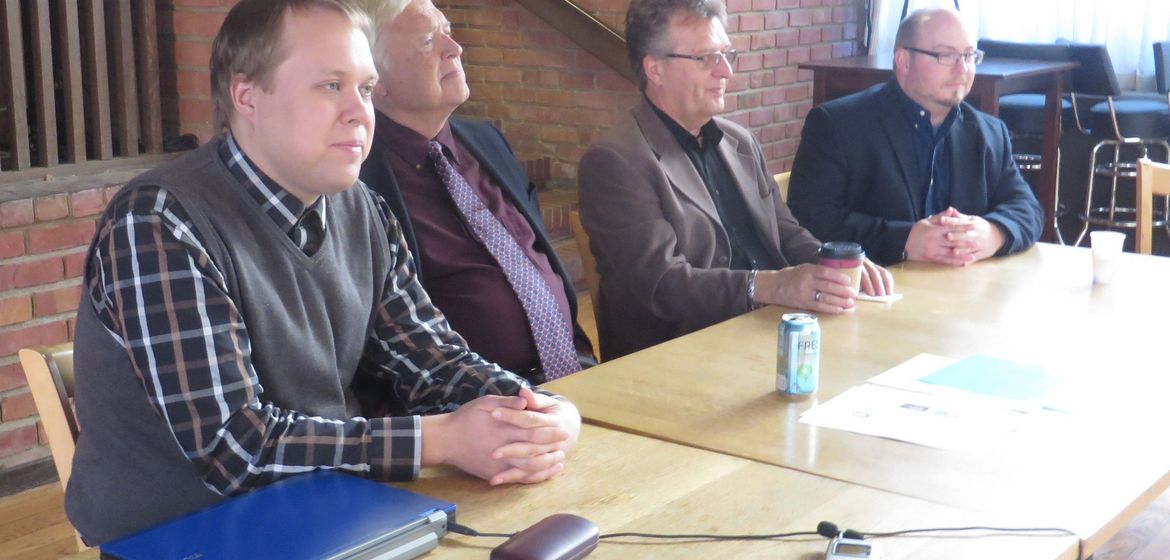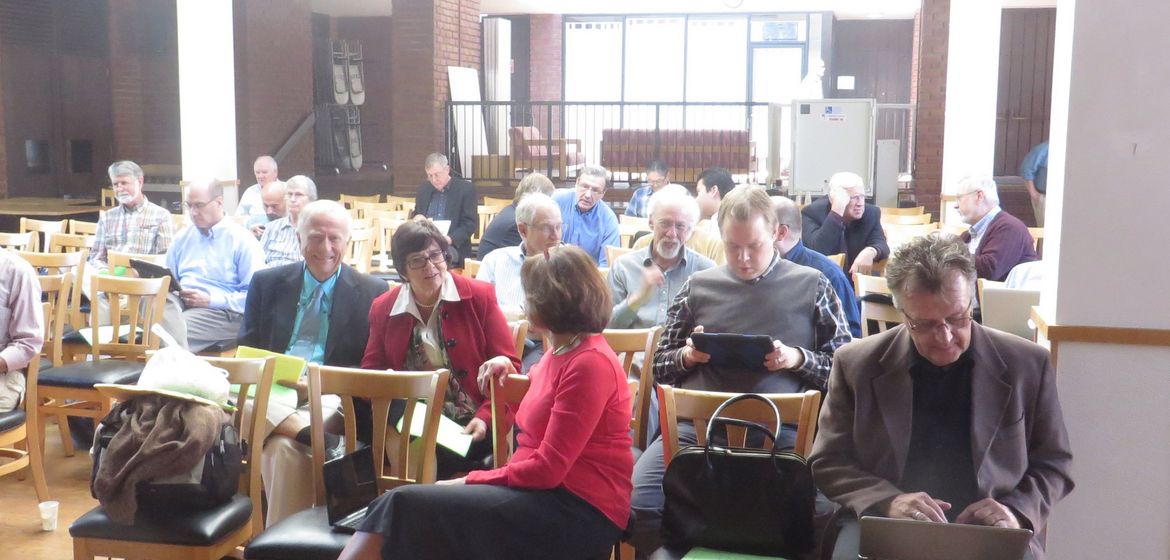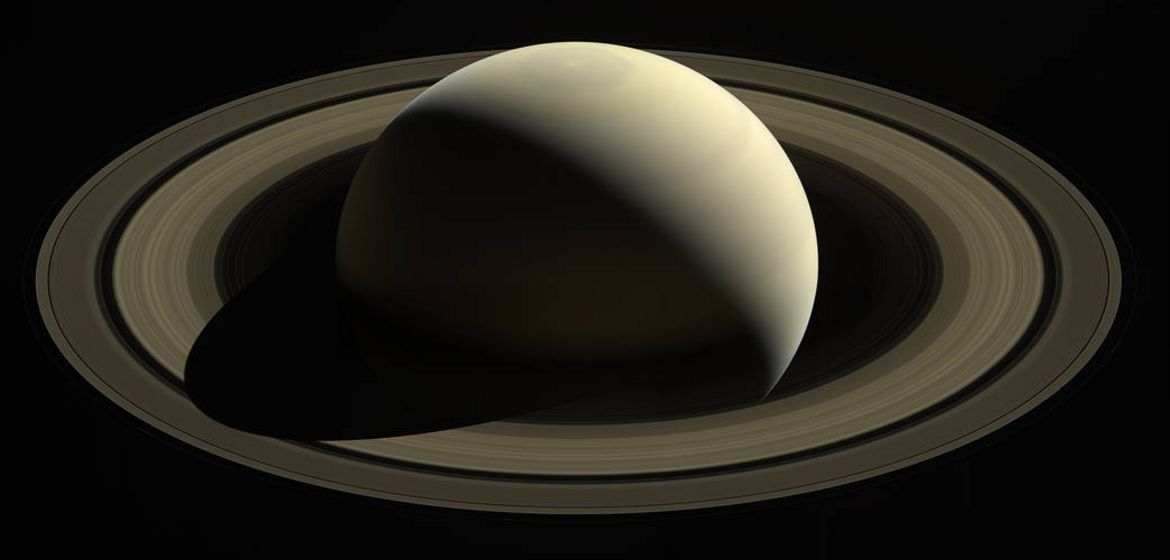Scientific And Theological Understandings of Randomness in Nature (SATURN)
SATURN was an interdisciplinary research program in theology and science created and administered by CTNS and supported by a $200,000 grant from Calvin College.
The purpose of the SATURN program was to study the scientific warrants for and theological implications of randomness, propensities and indeterminism in nature. We chose the acronym SATURN for this research on the “Scientific and Theological Understandings of Randomness in Nature” because the rings of the planet Saturn exhibit the kind of self-organization that can come about in nature through random processes and gravitational interactions.
To date, scholars in the theology and science community have made a strong case for three closely related claims: 1) that God acts at the atomic and subatomic levels of nature, 2) that such divine action makes objective differences in the course of nature, and 3) that God does so without violating or suspending natural processes. Such divine action is referred to as NIODA or non-interventionist objective divine action. The key to making this claim is a compelling philosophical interpretation of quantum mechanics in which atomic and subatomic processes are taken to be causally open (i.e., indeterministic)
The purpose of this new program was to study the possibility that discoveries in the natural sciences over the past decade point to indeterminism at many more levels in nature ranging from macroscopic physical and biological processes of daily life to the universe as a whole. Areas of research include:
- the macroscopic expression of quantum entanglement (in which once bound quantum particles, when separated over enormous distances, continue to show simultaneous correlations in their properties)
- subtle propensities (tendencies) in apparently random processes in physics and biology
- dynamic self-organization in large-scale physical systems (such as terrestrial meteorology and the rings of Saturn)
- the emergence of new properties and processes in complex biological systems which can causally effect the functioning of some properties and processes at lower levels in these system (strong emergence) and the effect of the system as a whole on its underlying parts (top-down/whole-part causality).
- the capacity for autopoiesis (self-regulation in complex, thermodynamically open systems such as the biological cell)
- the universe as understood in terms of quantum cosmology (a quantum-mechanical approach to cosmology) and superstring theory / multiverse cosmology (in which our universe is part of a vast collection of possible universes referred to as the “multiverse”).
If this possibility for widespread indeterminism in nature is valid, could it be that God acts in many, perhaps all, levels of nature without intervening in them or violating and suspending these processes? Theologians refer to routine divine action in and through the ordinary and regular processes of nature, such as the annual seasons and the bounty of food and the joy of human fellowship, as general providence. Now this new non-interventionist view of divine action throughout nature can be seen as a form of special providence, signifying particular events of sacred significance in personal life and human history, but yet events not warranting the term “miraculous.” Of special significance here would be the claim that God’s action makes specific differences in the evolution of life, a view often called “theistic evolution.”
The SATURN program brought together scholars in the natural sciences, philosophy, history of science, and theology for a public event available online and a private research conference at CTNS. The results will be published as an edited book and articles in scholarly and popular journals. New courses will also be created for seminary and doctoral students incorporating this new research.
Details. The SATURN program builds upon the accomplishments of the collaborative research program of CTNS and the Vatican Observatory (VO). During the 1990s and 2000s, VO/CTNS convened a series of international and ecumenical conferences in theology, philosophy and science. Many of the resulting publications made a strong case for nature as indeterministic and thus for the intelligibility of non-interventionist divine action both throughout the 13.8 billion year history of the universe and the 3.85 billion year evolution of life on earth. Scientifically the case for NIODA was made primarily in terms of quantum mechanics and its indeterministic interpretation as advanced originally by Werner Heisenberg and as adopted currently by most physicists.
The SATURN program enquired whether there is increasing evidence for extending this indeterministic interpretation beyond the domain of subatomic physics to include many other areas of nature. A much broader view of indeterminism in nature might offer fascinating new theological insights regarding:
- the relation between randomness, divine providence and God’s foreknowledge of future events
- the relation between eternity and time
- God’s relation to suffering, disease, death and extinction during the evolution of life on earth
It will encourage scientists to recognize that their research is consistent with their faith and that their scientific labor is a genuine form of religious vocation. Finally it will challenge those atheists who seek to misuse science to support a materialist agenda.
Participants include mathematician Jim Bradley, physicists Gerald Cleaver and George Ellis, philosopher Alicia Juarrero, theologians Veli-Matti Kärkkäinen, Rope Kojonen, Joshua Moritz, and Ted Peters, ecologist Robert Ulanowicz, and theologian and physicist Robert Russell (Principal Investigator).
The highlight of the program was an international conference in Berkeley in October 2014 and the conference papers are currently undergoing publication through Templeton Press.
Audio recordings of the public event are now available in two parts.
First Half Second Half
Video recordings of the public event are also available on our Vimeo page
Participants
Robert J. Russell, the PI of the program, is Founder and Director of the Center for Theology and the Natural Sciences (CTNS), and the Ian G. Barbour Professor of Theology and Science in Residence at the Graduate Theological Union, Berkeley, CA. He is a leading researcher and spokesperson for the growing international body of theologians and scientists committed to a positive dialogue and creative mutual interaction between these fields. He is the author of Time in Eternity: Pannenberg, Physics and Eschatology in Creative Mutual Interaction (University of Notre Dame, 2012); Cosmology from Alpha to Omega: The Creative Mutual Interaction of Theology and Science (Fortress, 2009) and Cosmology, Evolution, and Resurrection Hope: Theology and Science in Creative Mutual Interaction (Pandora, 2006). He has co-edited a six volume CTNS/Vatican Observatory series on scientific perspectives on divine action and the first volume in a new series on the problem of natural evil. He is a founding co-editor of the scholarly journal Theology and Science and an ordained minister in the United Church of Christ. He received a Ph.D. in physics from the University of California at Santa Cruz (1978), and an M.A. in Theology and an M. Div. from Pacific School of Religion (1972). His spouse, Charlotte, is an associate minister at First Congregational Church, Berkeley.
James Bradley is an emeritus professor of Mathematics from Calvin College. He has a BS from MIT and a PhD from the University of Rochester, both in Mathematics. He also has a MS in Computer Science from RIT. His mathematical specialty has been game theory and operations research. In recent years, he has pursued an interest in mathematics and theology. He coedited Mathematics in a Postmodern Age: a Christian Perspective and the mathematics volume in Harper One’s Through the Eyes of Faithseries. He also edits the Journal of the Association of Christians in the Mathematical Sciences. He is married, has two adult children, and three grandchildren. He is an active member of the Church of the Servant, a Christian Reformed Church in Grand Rapids, MI. His avocations include canoeing and hiking.
Gerald Cleaver is Professor and Graduate Program Director of the Department of Physics at Baylor University. He heads the Early Universe Cosmology and String Theory Division of Baylor’s Center for Astrophysics, Space Physics and Engineering Research. Cleaver earned his Ph.D. at Caltech in 1993. His research specialties are string model analysis and systematic investigations of the theorized string multiverse. He has written over 70 peer-reviewed journal articles and conference proceedings. Cleaver is a referee for eight physics journals and is a member of four IQ and six science honor societies. He is a Fellow of the American Scientific Affiliation and a member of the Center for Theology and the Natural Sciences. Cleaver is a book reviewer for the Perspectives on Science and Theology journal. He is deeply interested in the intersection between science and theology and has spoken at numerous related conferences. Cleaver and his wife Lisa have three children. Cleaver’s interests include flying radio controlled model airplanes, Tae Kwon Do, scuba, sailing, and snow skiing.
George F R Ellis, FRS, is a cosmologist who now also works on the emergence of complexity and causation in complex systems. He is currently the Emeritus Distinguished Professor of complex systems in the Department of Mathematics and Applied Mathematics at the University of Cape Town in South Africa. Ellis graduated from the University of Cape Town in 1960 with a Bachelor of Science degree in Physics and went on to receive a PhD in Applied Mathematics and Theoretical Physics from the University of Cambridge in 1964. He has lectured at the Universities of Cambridge, Texas, Chicago, Hamburg, Boston, and Alberta, was Professor of Cosmic Physics at SISSA (Trieste) for a number of years, and is the G C MacVittie Visiting Professor of Astronomy in the Mathematics Department at Queen Mary, London University. Ellis was co-author with Steven Hawking of The Large Scale Structure of Space-Time, which was published in 1973, and of On the Moral Nature of the Universe with Nancey Murphy, published in 1995. He was also the recipient of the Templeton Prize in 2004 and the Star of South Africa Medal, presented by President Nelson Mandela, in 1999.
Alicia Juarrero is Professor of Philosophy Emerita at Prince George's Community College in Largo, Maryland, where she taught as Professor of Philosophy from 1975 to 2006. Her book publications include Dynamics in Action (MIT Press, 1999) and two co-authored books, Reframing Complexity: Perspectives from North and South (ISCE Publishing, 2007) and Emergence, Self-Organization and Complexity: Precursors and Prototypes(ISCE Publishing, 2008). Her awards include, the 2002 U.S. Professor of the Year Award from the Council for the Advancement and Support of Education (CASE), Carnegie Foundation for the Advancement of Teaching and from 1992 to 2000 she served as chair of the National Endowment for the Humanities’s Council Committee on State Programs. Juarrero did her PhD, MA and BA work at the University of Miami.
Veli-Matti Kärkkäinen is Professor of Systematic Theology at Fuller Theological Seminary, Pasadena, CA and Docent of Ecumenics at the University of Helsinki. A n ative of Finland, he has also lived and taught theology in Thailand. He has participated widely in the ecumenical, theological, and interreligious work of the World Council of Churches, Faith and Order, and several international bi-lateral dialogues. He travels widely to give lectures and participate in consultations and seminars. In addition to more than 100 articles and essays, Dr. Kärkkäinen has written and edited 20 books, including Trinity and Religious Pluralism ( Ashgate) and The Trinity: Global Perspectives(WJKP). He is also the editor of Holy Spirit and Salvation , in the series The Westminster Collection of Sources of Christian Theology and co-editor of The Global Dictionary of Theology (IVP) . Currently he is working with a five-volume project titled Constructive Christian Theology for the Pluralistic World (Eerdmans 2013-17), which develops a constructive/systematic theology in an intercultural, interdisciplinary, and interreligious environment. After the first two volumes, Christ and Reconciliation (2013) and Trinity and Revelation (2014), the next one to be published is on Creation and Humanity(2015). Currently he is working with the last volume, Community and Hope (2017) with the focus on interdisciplinary and interreligious viewpoints on eschatology.
Rope Kojonen is a Finnish doctoral student of theology at the University of Helsinki, Faculty of Theology, where he also teaches courses on systematic theology and the philosophy of religion. He is editor of the Finnish science and theology web magazine Areiopagi.fi - the first Finnish journal dedicated to science and theology. He has written several articles on science and theology in both Finnish and English, with recent work including "Tensions in Intelligent Design's Critique of Theistic Evolutionism" (2013), "Natural Theologies and Theologies of Nature" (2013), and "Cosmology and Modern Natural Theology" (2013). He defended his doctoral dissertation "Intelligent Design: A Theological and Philosophical Analysis" in Helsinki in 2014. His research focuses on the theological and philosophical assumptions of different viewpoints in the contemporary discussion on theology and science. He is married and has two small children.
Joshua M. Moritz PhD, is Lecturer of Philosophical Theology and the Natural Sciences at the Graduate Theological Union in Berkeley, Adjunct Professor of Philosophy at the University of San Francisco, and Managing Editor of the journal Theology and Science. Having earned undergraduate degrees in biology, the Classical languages, and history from Calvin College in Grand Rapids, MI, Moritz went on to pursue graduate studies at Moravian Seminary in Bethlehem, PA. He then completed his MA and PhD in philosophical and systematic theology at the Graduate Theological Union in Berkeley, focusing on the relationship between philosophical theology and the natural sciences. His primary research areas include the problem of evolutionary evil; human evolution, human nature, non-human hominins and the imago Dei; astrotheology; and theological understandings of non-human animals and animal mentality. He is co-editor of Theologians in their own Words (Fortress, 2013) and of Theological Method and Models: Philosophical and Scientific Models for Constructive Theology (forthcoming).
Ted Peters is a Lutheran pastor as well as Research Professor Emeritus of Systematic Theology and Ethics at Pacific Lutheran Theological Seminary and the Graduate Theological Union in Berkeley, California. He is former editor-in-chief of Dialog, A Journal of Theology; and currently along with Robert John Russell he co-edits the journal, Theology and Science, published by Routledge for the Center for Theology and the Natural Sciences. He is author of God—The World’s Future: Systematic Theology for a Postmodern Age (Fortress 2000) and Sin: Radical Evil in Soul and Society (Eerdmans 1994). He also wrote Science, Theology and Ethics (Ashgate 2003); Playing God? Genetic Determinism and Human Freedom (Routledge, 2nd ed., 2002); and Anticipating Omega (Vandenhoeck & Ruprecht 2008). He is co-author with Martinez Hewlett of Can You Believe in God and Evolution? (Abingdon 2009); and he is co-editor of Bridging Science and Religion (SCM & Fortress, 2002).
Robert E. Ulanowicz is Professor Emeritus of Theoretical Ecology with the University of Maryland's Chesapeake Biological Laboratory. He is a 1961 graduate of the Baltimore Polytechnic Institute and received a B.E.S. and Ph.D. in Chemical Engineering from the Johns Hopkins University in 1964 and 1968, respectively. He served as Assistant Professor of Chemical Engineering at the Catholic University of America before joining the Chesapeake Biological Laboratory in 1970. He is fluent in German, conversational in Ukrainian and has a reading knowledge of Polish, French and Spanish. Earlier at CBL, Prof. Ulanowicz pursued research into the estuarine hydrography of Chesapeake Bay and on methods for inverse modeling of ecological systems. His current interests include network analysis of trophic exchanges in ecosystems, information theory as applied to ecological systems, the thermodynamics of living systems, causality in living systems, and modeling subtropical wetland ecosystems in Florida (ATLSS) and in Belize . He has applied ecological principles to economic systems and participated in the ongoing dialog between science and religion. Upon retiring, Ulanowicz moved with his wife to Gainesville, Florida, where he is Courtesy Professor with the Arthur R. Marshall Laboratory of the Department of Biology, University of Florida.















